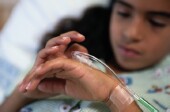 |
 |
 |

In Kids, Genes May Affect Leukemia Treatment
Finding could help tailor therapy regimen to individuals, experts say|
|
HealthDay
Tuesday, January 27, 2009
 TUESDAY, Jan. 27 (HealthDay News) -- Genetic variations appear to affect the way children respond to treatment for lymphoblastic leukemia, researchers report.
TUESDAY, Jan. 27 (HealthDay News) -- Genetic variations appear to affect the way children respond to treatment for lymphoblastic leukemia, researchers report.
Although about 80 percent of children suffering from this type of blood and bone marrow cancer are cured, some children do not respond to treatment. Now researchers think they know why.
"For the first time, we used a genome-wide strategy to interrogate over 500,000 variations in inherited DNA to find common gene variations called SNPs, or single nucleotide polymorphisms, that predicted response to chemotherapy," said lead researcher Mary V. Relling, who chairs the pharmaceutical department at St. Jude Children's Research Hospital in Memphis, Tenn.
Much of the emphasis in research on why chemotherapy works better on some people than others has focused on differences in the leukemia cells themselves, Relling noted.
"Our findings imply that the DNA patients inherit from their parents also explains why some patients respond to chemotherapy better than others," she said. "We also found some interesting genes that were previously under-appreciated and may provide new targets for new drug development."
The report is published in the Jan. 28 issue of the Journal of the American Medical Association.
For the study, Relling's team studied genetic variations in 487 children with lymphoblastic leukemia. Their goal was to find evidence of disease that persisted after treatment.
The researchers found 102 SNPs associated with minimal residual disease. "A high proportion of the gene variations were related to levels of the chemotherapy in blood and in leukemia cells; some were related to leukemia cell biology," Relling said.
An equal number, 21, were also associated with blood-related relapse and with the performance of antileukemic drugs. Overall, 61.7 percent of the SNPs were linked to early response, relapse risk or the performance of antileukemic drugs, the researchers found.
"Some of the gene variation is likely to cause differences among patients in how quickly their bodies rid themselves of the chemotherapy, and some of the variations are likely to penetrate through to the leukemia cells and have an influence on the inherent sensitivity of the leukemia cells to chemotherapy," Relling said.
Knowing the genetics of patients and knowing the genetics of their tumors are both important in designing effective treatments, she explained.
"When modern genomics is used to try to personalize medication regimens for cancer, we will need to consider the genetic variation that each patient has inherited, in addition to the genetic variation that is unique to the tumor cells," Relling said. "It will be necessary to continue to do genomic research in as many patients with cancer as possible in order to be able to apply these results in the future."
Dr. Barton Kamen, chief medical officer of the Leukemia & Lymphoma Society, noted that almost 20 percent of children treated for lymphoblastic leukemia suffer cognitive damage from chemotherapy.
"The problem is that the high cure rate of lymphoblastic leukemia still has a price," Kamen said. But knowing the genetic makeup of people and their disease, he said, might make it possible to make treatment less toxic by using lower doses for a shorter time.
In addition, knowing the genetic makeup of children with lymphoblastic leukemia "might point to the reasons for the failure of treatment so we can do something better for the 20 percent of the kids who are destined to fail," Kamen said.
HealthDay
Copyright (c) 2009 ScoutNews, LLC. All rights reserved.
Related News:
- More News on Cancer Chemotherapy
- More News on Genes and Gene Therapy
- More News on Leukemia, Childhood
More News on this Date
Related MedlinePlus Pages:
| Home | Health Topics | Drugs & Supplements | Encyclopedia | Dictionary | News | Directories | Other Resources | |
| Disclaimers | Copyright | Privacy | Accessibility | Quality Guidelines U.S. National Library of Medicine, 8600 Rockville Pike, Bethesda, MD 20894 National Institutes of Health | Department of Health & Human Services |
Date last updated: 28 January 2009 |




